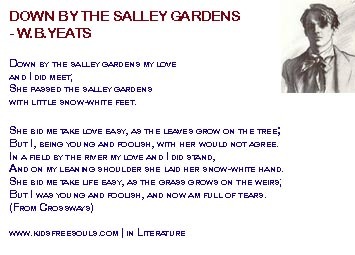WILLIAM BUTLER YEATS
(1865-1939 )
It was William Butler Yeats who got the Nobel Prize for Literature in 1923. And it the famous Abbey Theatre formerly, the Irish Literary Theatre which was founded partly to support Irish nationalism by encouraging the writing and production of plays about Irish life. The theatre performed most of Yeat’s 26 plays, and he served until his death as one of the directors who managed the institution.
Born on 13th June 1865, W.B. Yeats quoted once, “The innocent and the beautiful, Have no enemy but time” – And rhymed in A Song, “Oh, who could have foretold that the heart grows old?” and another rhyme in Responsibilities, “In dreams begin Responsibility” – Meaningful rhymed verses! He believed in the supernatural and the All Soul’s day calling of Ancestors, Yeats writes:
“The souls of the dead sometimes take the shape of animals. There is a garden at Sligo where the gardener sees a previous owner in the shape of a rabbit. They will sometimes take the shapes of insects, as well, especially butterflies.”
Earth, receive an honoured guest;
William Yeats is laid to rest.
Let the Irish vessel lie
Emptied of its poetry.
– In memory of W.B. Yeats (1940) A.U. Auden
An Irish Poet and dramatist, won the 1923 Nobel Prize for Literature. Many critics consider him the greatest poet of his time. Yeats led the Irish Literary Revival, a movement of the late 1800s and early 1900 that stimulated new appreciation of traditional Irish Literature. The movement also encouraged the creation of works written in the spirit of Irish culture.
Yeats developed elaborate theories about history as a recurring cycle of events. He expressed his personal views about history and life through the use of old Irish tales and the facts and legends of Irish history. His views also reflect his belief in the supernatural. Yeats published his theories in A Vision (1925), a book that is useful as a guide to some of his more difficult poems.
Yeats was born in Dublin and lived in London for part of his childhood. He spent many holidays in Sligo, a country in Western Ireland that he loved and often wrote about. In 1898, he joined the authors Lady Gregory and Edward Martyn in establishing the Irish Literary Theatre. It was reorganized in 1904 as the Abbey Theatre, which became world famous.
The Irish Literary Theatre was founded partly to support Irish nationalism by encouraging the writing and production of plays about Irish life. The theatre performed most of Yeat’s 26 plays, and he served until his death as one of the directors who managed the institution. The theatre’s first production was Yeats’ The Countess Cathleen, written in 1891. This play was inspired in part by the author’s love for Maud Gonne, a beautiful Irish nationalist leader. She became the subject of many of his plays and love lyrics.
Yeast’s verse, unlike that of most poets improved as he grew older. He wrote much of his best work in the last 10 years of his life. His most important works were published in Collected Plays (1952) and the The Poems: A New Editor (1984). Memoirs, containing autobiographical writings, was published in 1973.
DOWN BY THE SALLEY GARDENS
– W.B.YEATS
Down by the salley gardens my love and I did meet;
She passed the salley gardens with little snow-white feet.
She bid me take love easy, as the leaves grow on the tree;
But I, being young and foolish, with her would not agree.
In a field by the river my love and I did stand,
And on my leaning shoulder she laid her snow-white hand.
She bid me take life easy, as the grass grows on the weirs;
But I was young and foolish, and now am full of tears.
(From Crossways)
WHEN YOU ARE OLD
When you are old and gray and full of sleep,
And nodding by the fire, take down this book, And slowly read, and dream of the soft look Your eyes had once, and of their shadows deep;
How many loved your moments of glad grace,
And loved your beauty with love false or true
But one man loved the pilgrim soul in you,
And loved the sorrows of your changing face.
And bending down beside the glowing bars Murmur, a little sadly, how love fled And paced upon the mountains overhead
And hid his face amid a crowd of stars.
(From The Rose)
TO A FRIEND
Now all the truth is out,
Be secret and take defeat
From any brazen throat,
For how can you compete,
Being honour bred, with one
Who, were it proved he lies,
Were neither shamed in his own
Nor in his neighbours’ eyes?
Bred to a harder thing
Than Triumph, turn away
And like a laughing string
Whereon mad fingers play
Amid a place of stone,
Be secret and exult,
Because of all things know
That is most difficult.
(From Responsibilites)








